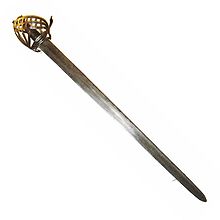broadsword
See also: broad sword
English

Alternative forms
Etymology
Pronunciation
- Lua error in Module:parameters at line 376: Parameter 1 should be a valid language or etymology language code; the value "UK" is not valid. See WT:LOL and WT:LOL/E. IPA(key): /ˈbɹɔːd.sɔːd/
Noun
broadsword (plural broadswords)
- (history) A type of early modern sword that has a broad double-edged blade for cutting (as opposed to the more slender thrust-oriented rapier) and a basket hilt.
- 1861, John George Wood, Athletic Sports and Recreations for Boys[1], page 93:
- The principal distinction between the broadsword and the rapier is, that the latter is formed only for thrusting, while the former is adapted for cutting also. Indeed, those who use the broadsword are, in my opinion, too apt to neglect the use of the point, and to give their attention almost exclusively to the cuts.
- A person armed with such a sword.
- (colloquial, often fantasy) Synonym of longsword
- 1990, Robert Jordan, “Conan the Magnificent”, in The Conan Chronicles II, published 1997:
- The Brythunian's arm drew back; the ancient broadsword with its strange, clawed quillons arcked spinning through the air.
- 2013, Colin Brown, “1415 Azincourt”, in Glory and B*llocks: The Truth Behind Ten Defining Events in British History[3], →ISBN, page 46:
- Henry carried a heavy broadsword with a cruciform hilt, and a decorated dagger on his hip known as a misericord because its blade could release souls. The English knights and men-at-arms carried broadswords, maces for smashing skulls and the murderous pole-axe, combining a spear with an axehead about five feet long.
Translations
longsword with a broad cutting blade
|